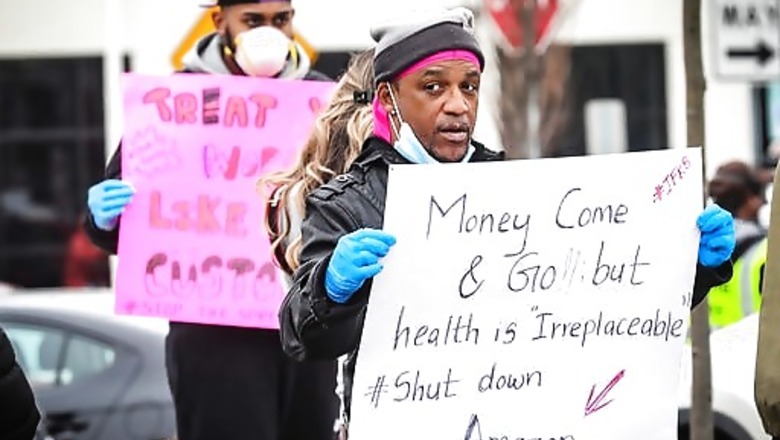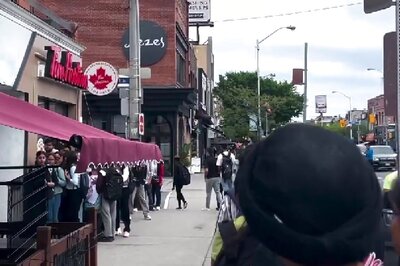
views
PORTLAND, Maine: Plans for a lawsuit against a Maine venue that hosted what became a superspreader wedding reception underscore the liability risks to small businesses amid the coronavirus pandemic and an uphill push by Republicans in Congress to give such outfits legal immunity.
Behemoths like Walmart and Tyson Foods, which have been the target of COVID-19-related lawsuits, can largely absorb any losses. But hundreds of negligence lawsuits have been filed across the country, with mom-and-pops most fearing the prospect of litigation that could put them under.
They can end up losing even if they win a lawsuit, said David Clough, of the National Federation of Independent Businesses, because costly litigation can bankrupt small businesses that dont have deep pockets.
For the family-owned Big Moose Inn in Millinocket, Maine, its not a theoretical problem. The estates of at least three nursing home residents whose deaths were linked to a wedding reception there in August intend to sue the inn and the nursing home, said the families attorney, Timothy Kenlan.
The wedding and reception sparked outbreaks that infected at least 180 people and caused at least eight deaths, state officials said. Seven of those who died were residents of the Maplecrest nursing home in Madison, Maine, whose attorney declined to comment.
A notice of claim indicates damages will be sought from the inn for hosting an event that Kenlan contends violated state safety protocols during a pandemic.
What stands out here is the egregious conduct. They put profits ahead of people, Kenlan said. They were flouting the rules.
Paul Brown, attorney for Big Moose Inn, said theres no way to prove the wedding reception was the source of infections. There were several other events including an outing at a lake and the wedding itself at a nearby church that were just as likely to have been the source of infections, he said.
The number of reception guests at the inn exceeded the state limit of 50 people, the Maine Center for Disease Control and Prevention said. But Brown contends the business tried to follow rules by dividing the reception into two groups of fewer than 50, so there was no violation, he said.
During the reception, signs warned guests to wear masks and to maintain distance, but there was no mandate at the time to enforce those rules.
A national lawsuit tracker by Hunton Andrews Kurth indicates more than 6,000 coronavirus-related complaints have been filed across the country.
Many involve attacks on pandemic restrictions, while others have targeted banks and insurers, and there have been thousands more workers compensation claims, as well, said Alexandra Cunningham, of the Richmond, Virginia, law firm.
But a much smaller number about 270 individual lawsuits are wrongful death, personal injury or workplace safety claims, mostly targeting cruise ships, meat-processing plants and other businesses, including nursing homes, she said.
The lawsuits tend to focus on the most egregious cases.
A lawsuit targeting a Tyson Foods plant in Iowa said workers lacked masks and were forced to work close together, while managers bet on how many workers would get infected during a coronavirus outbreak. Tyson investigated in response to the lawsuit and fired seven managers.
Walmart is the subject of a wrongful death lawsuit after a worker died of COVID-19 complications in March. A class action lawsuit is targeting McDonalds. The ACLU sued on behalf of workers at a Nebraska meatpacking pant. And a federal judge dismissed a lawsuit by Amazon warehouse workers.
Although there are very few cases, those cases are really important because they represent critical cases of worker safety, said Julia Duncan from American Association for Justice, which represents trial attorneys.
Those large corporations can better weather a lawsuit than small businesses like the Big Moose Inn, for whom legal fees and damages could be crippling.
Republican efforts to protect businesses from legal liability were a sticking point in Congress over a $900 billion-plus pandemic aid package.
Many Democrats object to a liability shield and say the Trump administration has already given companies the upper hand on safety issues by relaxing protections for workers.
The liability issue has been set aside for now but will be back in the new year, and state lawmakers likely will weigh in, as well, said Clough, the state director for the National Federation of Independent Businesses, which represents nearly 3,000 small, independent businesses in Maine.
Before the liability issue was set aside, the discussion focused on immunity for businesses except in cases of gross negligence, something trial lawyers criticize as a fancy way of dressing up full liability from virus lawsuits. There havent been enough lawsuits to justify special protections, trial lawyers say.
While the specter of lawsuits unsettles business owners, it might be difficult for plaintiffs to prove they caught the virus at a specific establishment, or of proving negligence, because the rules and safety guidance have evolved. Masks, for example, were not recommended initially; now they’re recommended and sometimes mandated.
Lawsuits require a plaintiff to prove both harm and negligence that an entity failed to protect someone from a reasonably foreseeable event, said Jim Burke, professor emeritus at the University of Maine School of Law.
Proving where someone contracted the virus is central to winning a lawsuit, and that was difficult even before the latest surge of the virus, Burke said. As the community spread gets broader, it will become harder to prove causation, he said.
For the Big Moose Inn, its lawyer believes some form of liability protection is warranted.
If a business is complying with the requirements, doing the best they can, making the effort to keep employees and guests safe, then there should be some liability shield, Brown said. If theyre working hard and trying, they shouldnt be penalized for something thats really outside their control.
Many attorneys are likely waiting to see how lawsuits like the one thats anticipated against Big Moose Inn play out, Cunningham said.
The statute of limitations for such negligence claims generally is two to three years, she said.
Disclaimer: This post has been auto-published from an agency feed without any modifications to the text and has not been reviewed by an editor
Read all the Latest News, Breaking News and Coronavirus News here

















Comments
0 comment